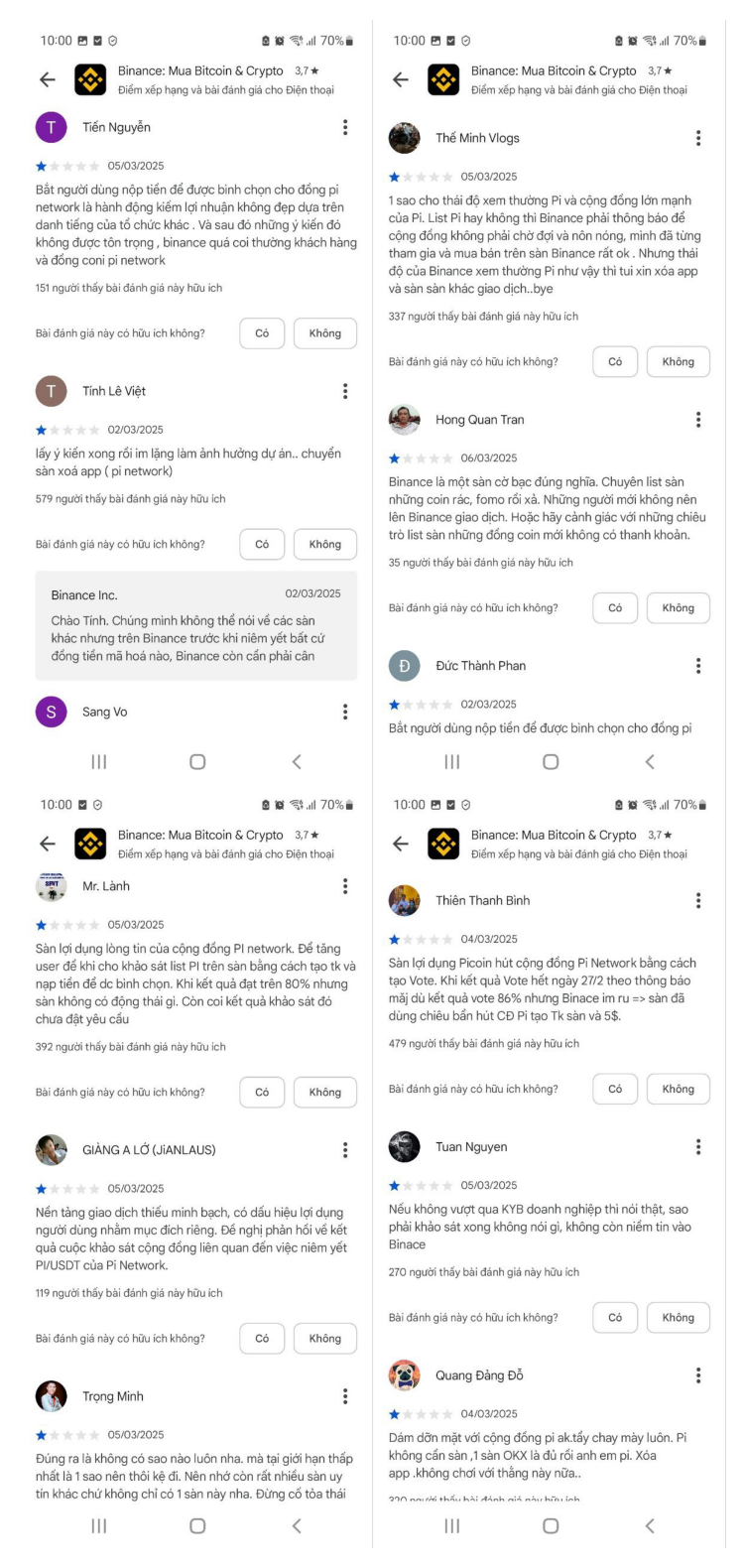The application of Binance, the world's largest cryptocurrency exchange, is facing a wave of 1-star reviews from the Pi Network community on Google Play and Apple App Store.
This movement originated from a post on a Facebook group about Pi Network with over 135,000 members, calling the community to "rate Binance 1 star for disregarding the Pi Network project". The call quickly spread on social media like Facebook and X, attracting the participation of many Pi players.
The incident occurred after Binance conducted a survey from 17/2 to 27/2 on whether to list the Pi Token or not. Although the approval rate was always above 85%, Binance emphasized that these results were only for reference and did not determine the listing. This made many Pi players feel "deceived" when they had to register an account, verify their identity (KYC) and deposit at least 5 USD to participate in the vote.

According to Hoang Anh, an administrator of a large Pi Network group on Facebook, many Pi players misunderstood that the survey results would determine the listing, leading to disappointment and negative reactions.
In addition to the feeling of being "deceived", some Pi players also expected Pi's price to skyrocket if it was listed on Binance. According to The Thanh, a cryptocurrency investor, many people may have bought Pi from smaller exchanges or other players, and then used the "pressure" tactic to push Binance to list Pi in order to profit.
The wave of 1-star reviews has significantly impacted Binance's reputation. Prior to 17/2, the Binance app on Google Play had a rating of 4.9/5 stars, but by 6/3 it had dropped to 3.8/5 stars with 2.86 million reviews. On the App Store, the app also dropped from 4.8/5 stars to 4.2/5 stars. Many comments criticized Binance for "deceiving deposits", "disregarding Pi Network" and "exploiting the trust of players".

Previously, the ByBit exchange also became a "victim" of the Pi Network community, causing the app on Google Play to drop from 4.7/5 stars to 2.8/5 stars after founder Ben Zhou warned about the risks of fraud related to Pi.
According to experts, Binance has good reasons to be cautious about Pi Network. Although the project has launched its network after 6 years, it has not yet announced the smart contract or open-sourced the code - the minimum requirements for a blockchain project. The founding team is also not transparent, with limited information beyond the two names Nicolas Kokkalis and Chengdiao Fan.
In addition, Pi's blockchain network is assessed as not fully decentralized, as all mainnet nodes are controlled by the development team. This raises doubts about the project's decentralization commitment.
The "1-star vote" action of a portion of Pi players is causing concern among many in this community. Hoang Anh commented: "This action may make other exchanges hesitant when considering listing Pi, causing more harm to the project than benefits."
Binance, founded in 2017, is currently the world's largest cryptocurrency exchange with a daily trading volume of nearly $22 billion. Meanwhile, Pi Network, launched in 2019, remains controversial as it took nearly 6 years to allow users to trade the token.
The Pi Network community's "attack" on major exchanges like Binance not only damages the exchange's reputation but also raises questions about the sustainability and transparency of the Pi Network project itself.
Disclaimer: This article is for informational purposes only and not investment advice. Investors should do their own research before making decisions. We are not responsible for your investment decisions.
Join Telegram: https://t.me/tapchibitcoinvn
Twitter (X): https://twitter.com/tapchibtc_io
Tiktok: https://www.tiktok.com/@tapchibitcoin
Youtube: https://www.youtube.com/@tapchibitcoinvn
Mr. Giao







